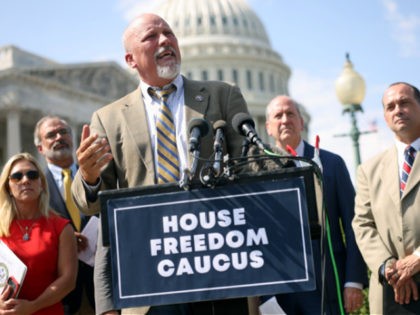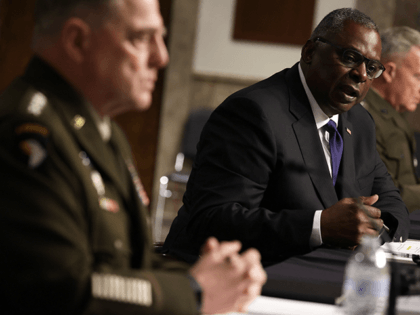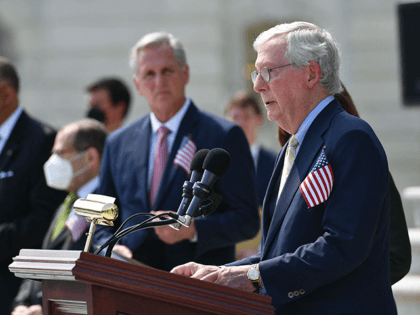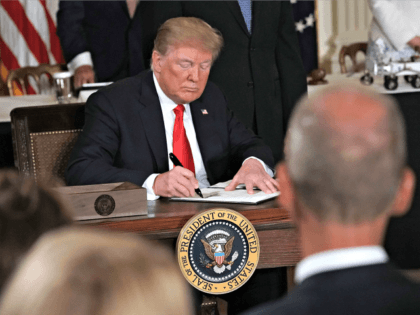Exclusive: Sen. Marsha Blackburn Pushing to Ban Discharge of Troops over Vaccine Mandate
Blackburn is pushing for an end to the discharge of troops who do not wish to be fully vaccinated per the Biden administration’s mandate.

Blackburn is pushing for an end to the discharge of troops who do not wish to be fully vaccinated per the Biden administration’s mandate.

The House Freedom Caucus is calling on Republicans to reject a massive defense bill unless it includes a repeal of woke Biden policies.

Democrats are using the National Defense Authorization Act to slide in policies completely unrelated to the military and keeping America safe.

Republicans called for the defense secretary to be fired if he does not repeal the Biden administration’s coronavirus vaccine mandate.

Banks helped kill an amendment that would have required defense contractors to report on their racial, ethnic, and gender diversity.

Conservatives flexed their muscles to kill progressive provisions in the defense bill authorizing the Pentagon’s budget and activities.

Two provisions staunchly opposed by a group of House Republicans have been scrapped from the 2022 National Defense Authorization Act.

A legislative fight to raise the debt ceiling could test Republicans’ resolve as Congress heads towards a packed legislative schedule ahead of the new year.

Senate Republicans blocked consideration of the National Defense Authorization Act (NDAA) on Monday as Democrats prevented the chamber from considering Republican amendments to the defense bill.

The federal government will run out of money in three days while a legislative pileup has continued to plague Sen. Chuck Schumer (D-NY), who failed on Monday to pass a routine defense bill to clear legislative calendar days to pass the $1.9 trillion reconciliation package.

The federal government will run out of money on Friday amid a jammed Senate schedule in December that may further delay the passage of the reconciliation package into next year.

Heritage Action for America will endorse amendments to strip a provision in the 2022 defense bill requiring women to register for the draft.

Rep. Chip Roy (R-TX) on Wednesday pledged in a letter to Republican colleagues that he would not support any of them for higher office if they vote for the final defense bill or any other bill that results in a military draft for women or red flag laws risking a service member’s 2nd Amendment rights.

Reps. Richard Hudson (R-NC), Stephanie Bice (R-OK), and 161 other lawmakers sent a September 29, 2021, letter to House and Senate Armed Services Committees urging removal the red flag provision from the 2022 National Defense Authorization Act (NDAA).

On Sunday, left-wing activist and filmmaker Michael Moore pushed for defense spending to address things such as the “climate catastrophe,” white supremacy and the coronavirus.

The 2022 National Defense Authorization Act (NDAA) contains a provision allowing military courts to issue orders restraining military personnel from “possessing, receiving, or otherwise accessing a firearm.”

On Tuesday’s broadcast of CNN’s “Situation Room,” Senate Minority Whip Dick Durbin (D-IL) disagreed with the push by Sen. Bernie Sanders (I-VT) to block the vote on the veto override for the National Defense Authorization Act unless there is a

On Friday’s “PBS NewsHour,” New York Times columnist David Brooks predicted that President Donald Trump’s veto of the National Defense Authorization Act (NDAA) will be overridden by Congress and that Republicans who voted for the bill will join in overriding the veto.

“Your failure to terminate the very dangerous national security risk of Section 230 will make our intelligence virtually impossible to conduct without everyone knowing what we are doing at every step,” Trump wrote.

President Donald Trump signaled that he would veto the bill if it did not eliminate Section 230 protections for tech companies.

President Donald Trump said he will veto the annual defense authorization bill over its exclusion of provisions that terminate Section 230, which grants Big Tech companies such as Twitter and Facebook special immunity from lawsuits.

Harris, who was tapped Tuesday as Joe Biden’s vice presidential pick for 2020, recently voiced support for defunding the Pentagon.

Trump tweeted Friday morning that Inhofe (R-OK) “will not” be changing the names of military bases named after Confederate generals.

The White House threatened to veto the annual defense bill over several provisions, including one on renaming military bases.

Rep. Jared Golden (D-ME) said on Sunday that he is “confident” that Republicans and Democrats could override President Donald Trump’s potential veto of a defense bill that would rename military bases named after Confederate generals.

The House Armed Services Committee passed a defense bill that requires the Pentagon strip Confederate names from military bases.

On Wednesday’s broadcast of the Fox News Channel’s “Daily Briefing,” Senate Majority Leader Mitch McConnell (R-KY) said that he hopes President Trump will not veto the National Defense Authorization Act (NDAA), which the president has threatened to do, over the

President Donald Trump tweeted Tuesday evening that he would veto the National Defense Authorization Act (NDAA) if it included an amendment to rename ten U.S. Army bases that had been named for Confederate generals.

Sen. Josh Hawley announced he will offer an amendment to the National Defense Authorization Act (NDAA) that would allow military bases named after Confederate generals to keep their names. During the speech, he chastised the left’s “historical revisionism.”

President Trump signed the 2020 National Defense Authorization Act that officially created the Space Force.

Reps. Matt Gaetz (R-FL) and Ro Khanna (D-CA), along with 16 other lawmakers, introduced Tuesday an amendment to the National Defense Authorization Act (NDAA) to prevent military force against Iran without congressional authorization.

A Chinese electronics company called Hikvision, partly owned by the Communist government, was one of several such firms banned from working for the U.S. government under the National Defense Authorization Act (NDAA) signed into law by President Trump on Monday.

Sen. Rand Paul (R-KY) wants to end the U.S. government’s ability to detain people indefinitely, arguing that it violates Americans’ Sixth Amendment rights to a speedy and public trial.

Chinese embassy minister Li Kexin warned Taiwanese officials on Friday that Beijing would use “military force” if the island nation welcomed U.S. Navy ships to its ports, claiming any U.S. presence in Taiwan would violate China’s Anti-Secession Law.

The Trump Administration is providing funding for the Texas National Guard’s efforts to assist in securing the state’s border with Mexico. This follows more than three years of the Obama Administration’s refusal to help with any funding for Texas’ border security operations.

The House on Friday rejected an amendment to a must-pass annual defense bill that would have required the military to study the link between Islamic doctrine and terrorism and make recommendations for identifying Islamic preachers promoting extremist ideology.

Contents: Thousands flee from Myanmar into China to escape army clashes with ethnic militias; Myanmar faces an investigation for ethnic cleansing of Rohingya Muslims

Rep. Mac Thornberry (R-TX), chairman of the congressional panel overseeing the Pentagon, indicated earlier this week that lawmakers could reconsider some defense programs put in place by the Obama administration.

The U.S. government is working on a new report, mandated by legislation signed into law before President Donald Trump took office, to evaluate whether the Russian and Chinese leadership have the capacity to survive a nuclear strike.

The Chinese Foreign Ministry and the nation’s state-run media have condemned Congress’s approval of new high-level military talks between the United States and Taiwan. The rebuke follows a month of vocal dismay in Beijing over President-elect Donald Trump’s questioning of the “One China” policy, which denies Taiwan’s sovereignty.
